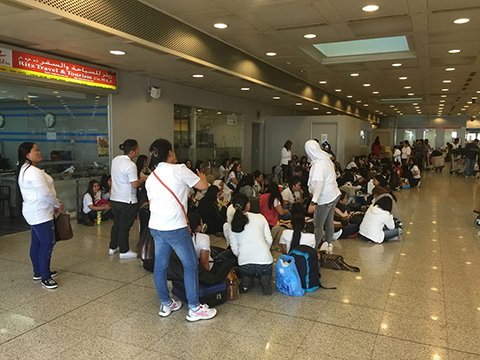 KUWAIT: Filipino nationals wait at Kuwait International Airport to board their planes back to their home country, in trips facilitated through the Assisted Voluntary Repatriation Program. — Photos by Ben Garcia
KUWAIT: Filipino nationals wait at Kuwait International Airport to board their planes back to their home country, in trips facilitated through the Assisted Voluntary Repatriation Program. — Photos by Ben GarciaKUWAIT: A total of 97 Overseas Filipino Workers (OFWs) were repatriated to the Philippines yesterday through the Assisted Voluntary Repatriation Program (AVRP), a scheme used by the Philippine Embassy as part of a mutual cooperation agreement between the two countries for easier repatriation of distressed workers. Workers that pass through the AVRP system are no longer held for days, weeks or even months at the deportation center in Talha, but they are instead sent straight to the airport from the embassy premises.
The repatriated workers that were flown back yesterday onboard Gulf Air were temporarily housed at the embassy's shelter in Hateen and POLO/OWWA in Faiha for various reasons ranging from maltreatment to sexual and verbal abuse. Almost 500 more OFWs are still at the embassy shelter waiting for the resolution of their cases.
"Ninety-seven is a good number and I thanked the Kuwaiti government for the assistance extended through AVRP, so we are able to repatriate distressed workers easily. I particularly thanked the Ministry of Interior and the Immigration Department for their assistance," said Francis Baquiran, Assistance to Nationals Unit Officer, as he led the workers at Kuwait International Airport. Baquiran urged undocumented Filipino workers in Kuwait to immediately contact the embassy so they could be assisted accordingly.
Various jobs
Many of those repatriated were domestic helpers, but among them were some restaurant workers, electricians and carpenters. Jun Saplot, 35, is an electrician who worked in a small company, but when he intended to transfer his visa, the company did not cooperate and filed an absconding case against him. "I went to the shuoon (the Ministry of Social Affairs and Labor's dispute department) for assistance, but the company owner did not cooperate, leaving me without a visa for the last three years.
I thought I will be released from the company but I wasn't. Thank God, during these three years, I was able to work part-time, but I was living in fear as I don't have an iqama, and I do not want to be in jail. I applied to the AVRP in April, and now I am heading to Manila, thanks to our embassy officials who really assisted us until this day in Kuwait," he said.
There are an estimated 220,000 Filipinos in Kuwait, more than one third of whom are engaged in domestic work. Around five to seven housemaids run away from their employers daily. According to Philippine Ambassador to Kuwait Renato Pedro Villa, the Philippines along with two other nations in Africa are the only remaining labor-exporting countries sending housemaids to Kuwait.
By Ben Garcia










